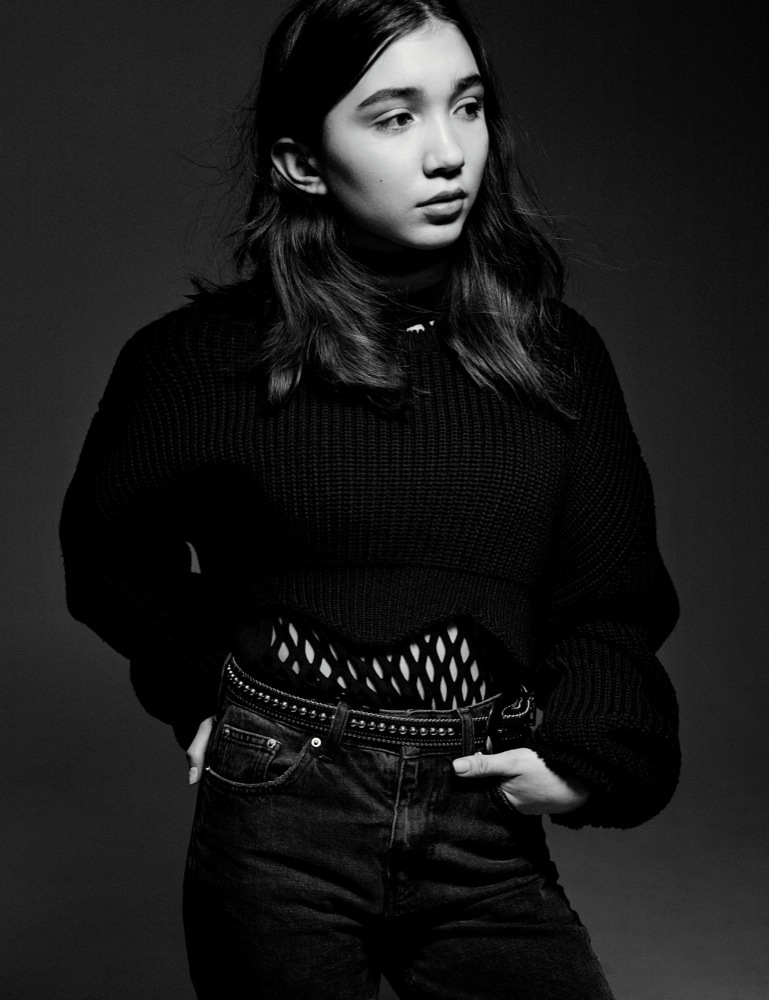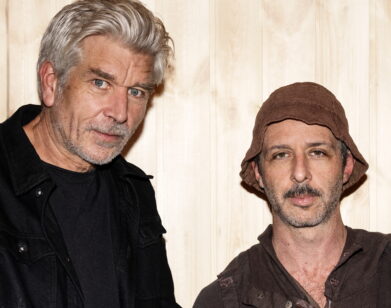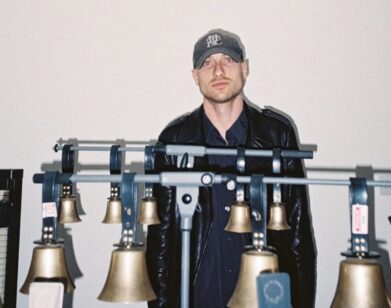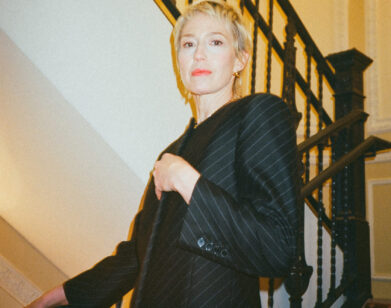Rowan Blanchard
In my work, I’m passionate about trying different things and being okay if I mess up. Now I’m trying to bring that into my own life. ROWAN BLANCHARD
On her wildly popular show Girl Meets World, and on her heavily trafficked social feeds, Rowan Blanchard has more than welcomed the responsibility of her profile. At only 14, the native Angeleno Blanchard speaks, tweets, and writes with ease, confidence, and urgency—on everything from intersectionality and the politics of feminism to the elitist girl gangs of social media and what makes really good writing move her. World, it’s time we meet one of the most exciting voices of her generation.
INTERVIEW: Have you been shooting all day?
ROWAN BLANCHARD: Today was a rehearsal day. We started season three a few weeks ago, so, yeah, I’m doing that. It’s fun.
INTERVIEW: It’s amazing to me that you’ve been doing this from such an early age. Has performing been helpful to you, as you’ve come into your own? Have you been able to try on traits as you do clothes in the costume trailer?
BLANCHARD: I think yes and no. There are definitely things about acting that have helped me growing up and finding myself, but there are also things that make it a bit more difficult. I guess I do allow myself to explore more when I know that, at the end of the day, if I really wanted to, I could just play a different person all day and be fine with that. But there are also points where I’m like, “Ahhh, there are too many people in my head.” In my work, I’m passionate about trying different things and being okay if I mess up. Now I’m trying to bring that into my own life.
INTERVIEW: To be your age and to have so much experience within your field has to give you great confidence, in life and work.
BLANCHARD: That’s only come into my life recently. I guess because, the more I get into teen years, the more emotions are just going everywhere … I feel horrible about myself, I feel great about myself. So it is nice to have this kind of comfort where, for instance, we just had a hiatus, and I decided not to do anything, because I was exhausted and I just kind of wanted to be by myself. And I realized at the end of it, like, that’s great, and I genuinely love to be by myself, but at the same time, it’s such a relief to know that I have another person’s head who I can go into and whose life I can live. It’s kind of an escape route, almost like therapy. It’s refreshing to know that I can go back to a place where I don’t have to be myself. When you’re a teen, and especially when you’re a child actor, the first thing that you hear is, “You don’t want to mess up; you don’t want to walk out of a club drunk,” and stuff like that. When I was younger, I had a bunch of adults telling me, “You can’t do this; you can’t do that. Be careful.” I was always receiving this kind of information, and I took it. And I put a lot of pressure on myself early in my life, like, “You have to be perfect; you can’t do anything.” You basically can’t show any emotion and speak up. And then I realized that I have to live my life for myself. But, more and more, if I mess up with one thing, I can kind of look back on it and just be like, “All right, well, that was a nice try, and at least you tried.” A lot of that has come through writing, too, where I was able to find ways to identify with people, through reading books and watching movies and television, where the characters were messing up and I could mess up, too.
INTERVIEW: Knowing what’s right for us and filtering through everything we’re told is so difficult. Especially if we feel at all cut off or different. Because you went to work so early, have you felt removed?
BLANCHARD: I started acting when I was 5, and it was always a part of my life. My life and acting weren’t separate things; they were always one. But when the show first premiered I was so afraid of somebody seeing me in a fight with my friends or something, just living in fear of people, in fear of somebody saying something bad about me. Because when a bunch of people make you re-evaluate yourself every five seconds, you start to really question your gravity and question how you matter. And then I guess I just started realizing that acting is a tool in my life. I could use it to help move myself along. I kind of had to re-evaluate my friendships. And it was difficult, because at the time, I remember every single day going to school and feeling so terrible about myself, because I always felt like the other kids hated me, but then would pretend to be friends with me. And it’s really scary, when you’re on the verge of becoming a teenager, and you don’t know if people like you for you or if they like you for the show you’re on. So I started finding friends who were not that way, who are accepting and see you who you are.
INTERVIEW: Where were you able to find the new friends?
BLANCHARD: It started when I found other hobbies that I really loved, because I remember always being in fear of other actresses who were my age. Not because they were my competition, but because I thought that they thought I was their competition. Once I put that guard down, I started hanging out with other actresses. We don’t always talk about acting, but it’s a part of our lives, and once I found things that I really love other than acting, like writing and art and stuff like that, that was a time for me to be able to find other people and be like, “Hey, do you want to hang out?” And bond over these things that we have in common.
INTERVIEW: Something you’ve talked about before is comparing yourself to others—it’s really a double—edged sword, isn’t it? Having heroes you can look up to but against whom you will always suffer in comparison.
BLANCHARD: It’s definitely a difficult thing, because you want to idolize these people, and you want to have them in your back pocket, to always feel like they’re there, your idols, your icons, the people that you love. But you don’t want to feel like you’re constantly evaluating yourself to be like them. I think I did that a lot when I first started writing publicly. Every time I would read something that another person wrote—it wouldn’t matter even if they were 30 years older than me and had written 15 books—I would just be like, “Why am I not writing like them?” Tavi wrote a piece for Rookie and she references this Bill Murray quote in it. Bill Murray was asked, “What is it like to be you?” And Bill Murray answered in the best way possible. He says, like, “Some of you guys are sitting down, some of you guys are standing up. But if you really take a moment and you go inside your body, you can feel your weight against the earth, and you can recognize that you’re the only person who’s feeling your own weight against the earth right now.” And that in itself is enough of a superpower, to be able to realize that. And he was like, “It feels pretty good to be you, because you’re the only you in this world.” And I guess that put things into perspective for me. I have that quote hanging on my wall. I read that when I’m having identity crises and I’m like, “I don’t know what’s going on!” I read that and it helps, to feel your own existence, to feel yourself moment to moment.
INTERVIEW: Bill Murray is the Buddha. But you’ve become a touching and comforting voice to a lot of people. Was there some sort of event that compelled you to start talking about intersectionality and feminism on your Tumblr and Twitter?
BLANCHARD: I would always acknowledge—personally, not publicly—the things that were going on, things that were happening in the world. But I still didn’t make the connection that those things happen to me. I remember I was at a movie with my friend, and we were both in skirts—this was two and a half or three years ago—we were waiting outside the movies for my dad to pick us up, and this grown man came over and was like, “You guys need a ride anywhere?” I was 12 years old and my friend was 15. And I just remember sitting there feeling my heart sink into my stomach. It was such a surreal moment. Because I always see that happening in front of me; I always see girls getting catcalled. But up until that point, I hadn’t experienced it. And it was like I was out-of-body for a second. I had seen that in movies, on TV, on the news. But when it happens to you, it’s like, “Oh, crap, this is real; people look at me this way. And people look at other girls this way.” I went home that night and didn’t tell anybody. I didn’t tell my parents because I was ashamed that it was what I was wearing. I was like, “Gosh, I shouldn’t wear a skirt next time. What am I doing?” My sister was 10 at the time, and I remember lying in bed and thinking, “I don’t want that to ever happen to her.” Then, once it happens to you, you see it everywhere. When you’re watching your favorite TV show, you see a joke that maybe would have gone over your head a month ago. You can’t escape it. There’s really nothing you can do except endure it and try and speak out about it. So that’s what I tried to do. Because it started consuming me. And, when girls would come up to me and be like, “I watch your show,” I would think, “Has this ever happened to this girl? Of course it’s happened to this girl, because it happens every day.” And it just started overwhelming me. So I started putting things on Twitter, Tumblr, and Instagram, because I realize that I have a following, and most of the people who watch our show, I would say, are girls. And I didn’t want them ever going through that. I just started doing it because I couldn’t bear it anymore.
It’s refreshing to know that I can go back to a place where I don’t have to be myself. ROWAN BLANCHARD
INTERVIEW: When you began engaging on the topic, you did it really eloquently. Did you have a mission to articulate it to people in a way that they would feel a connection to what you were saying—as opposed to the sort of noise that you were receiving when you were watching stuff like that on the news?
BLANCHARD: Yeah. I know that the things that have impacted me most are not news articles written by older people that I would have no relation to; the things that impact me most are things written by people closer to my age. People like Tavi. And I wanted to write things in a way where somebody my age could read it and feel like they are holding somebody’s hand and be with somebody.
INTERVIEW: You don’t seem to be weighed down at all by your massive following, whereas others can start to seem corporate and branded. You seem very much yourself online, engaged and personal. How are you able to do that?
BLANCHARD: I think it’s because when I’m writing, I’m in my bedroom, and it doesn’t really feel like there’s anybody else there. So I’m not totally aware of the other people that are potentially going to be reading this. Whenever I read a book … I just finished The Catcher in the Rye, and that book had such a deep impact on me, because it felt like it was just Holden and me. I didn’t feel like any other person had read that book. It felt like my secret. Writing that I identify with feels like it’s just me and the writer. So I hope that whoever is reading what I do feels like that.
INTERVIEW: You’ve been able to connect with some amazing people—Cecile Richards and Tavi for starters. But you’re also conscious about not wanting to make it seem as though there’s this sort of “mean-girls-you-can’t-sit-with-us”-ness about it. You don’t want to create some hashtag squadgoals thing to your friendships.
BLANCHARD: Part of the reason is because I couldn’t sit with the cool girls. I’m not even kidding. In middle school there was literally a spot for the cool kids to sit. You could only sit there if you were cool, and I wasn’t. So I would go read Hugo Cabret under the slides. All my friends were literary characters. So that’s so important to me, that a girl on Instagram doesn’t see a group of girls and feel intimidated. No girl should feel scared to be friends with other females. I was. I lived in fear of other girls. I remember saying, in seventh or eighth grade, “I only hang out with boys, because girls are really scary and mean.” Because of this whole image of perfection in friends groups, I was really scared that other girls hated me, that I wasn’t pretty enough or cool enough or I didn’t have enough Instagram followers or whatever. But finding female friendship was such a monumental point in my life. And I never want somebody to feel like they have to re-evaluate themselves to join my friends or to join any friend-group.
INTERVIEW: What kinds of pressure do you put on yourself now? What is your relationship with ambition?
BLANCHARD: I think that’s definitely an interesting thing to talk about. Because I did go through a thing where I was scared to put pressure on myself. Now, I’m not religious in the sense that I belong to a church or anything like that, but when I was younger I was very much into astrology and the moon and the planets. So I kind of formed my own belief system around this moment-to-moment type thing. And it’s hard to put in ambitions in a moment-to-moment existence, because you don’t want to think too much about the future. So I started following things that I really love, things that I can’t live without, like acting and writing. I can’t truly be myself without those things. So now, instead of comparing myself to somebody or being like, “I have to do this, this, this,” I just watch a lot of movies and think, “I would love to write that story,” or, “I would love to direct that.” And I will direct that, and I will write that, and I will act in that. That’s how I am now. And I don’t give myself time frames; I think we can get trapped in the concept of time: “If I don’t do this by this time, am I this person?” Back to that Bill Murray quote, “Yes, you are, because you’re yourself.” It doesn’t feel as scary as it used to. Partially because I have so many different role models who have taught me so many different things at so many different points in my life, it doesn’t feel like I have one person that I have to live up to. On the same wall where I have the Bill Murray quote, I have this list of life inspirations, and it’s everybody from Beyoncé to David Bowie to Madame X, which is a painting by John Singer Sargent. There’s a lot I want to do. People used to always talk down to me, like, “Oh, you’re so young,” but now I recognize that my age is an advantage; there’s a lot more I can do.
For more from The New Activists, click here.







